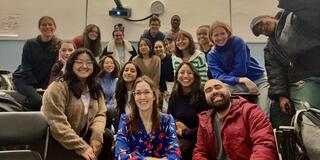What is the Urban and Social Policy (USP) Concentration?

What is the Urban and Social Policy (USP) Concentration?
USP is very near and dear to my heart. Arguably the coolest concentration at SIPA, USP is extremely flexible and allows you to explore the multifaceted nature of urban and social policies in all contexts. USP is divided into two focus areas (they can also be referred to as tracks): Urban Policy and Social Policy. Students must choose one of these focuses, and take courses related to that focus.
The Social Policy focus is “designed to provide students with the analytical tools, management skills and knowledge needed to design, implement and evaluate the outcomes of social policies that aim to increase access to economic opportunity in marginalized populations and manage economic and social risks, such as unemployment, poverty, social exclusion, crime, recidivism, homelessness, sickness, disability, and old age.”
On the other hand the Urban Policy focus is “designed to provide students with an understanding of the policy challenges and opportunities that are particular to cities in both the developed and developing world. SIPA focuses on the traditional urban policy fields like city management, urban planning, land use, housing, urban education, transit, as well as the most recent urban policy innovations in environmental sustainability, technological integration, globalization and business development.”
I encourage you to explore the SIPA Bulletin and check out the courses that are available to USP concentrators. In general, any course across the Columbia community will count toward the Urban or Social Policy focuses, as long as there is some connection. This is meant to give students complete control over the concentration, allowing you to develop expertise in any sub areas that are of interest to you.
Personal Experience with the Social Policy Focus
The highlight of the Social Policy focus is the core requirement: Comparative Social Welfare Policy with Professor Yumiko Shimabukuro. The course focuses on understanding how countries from various regions have developed welfare policies and why countries prioritize certain policies over others. Plus, Professor Yumi spoils her students with snacks every class session and makes sure you are engaged throughout the class.
Currently, I am enrolled in three Teachers College (TC) courses (Columbia’s school dedicated to graduate studies in psychology, education, and teaching): Education Policy Across the Americas; Civil Society Organizations and NGOs in International Education Development; and Education in Emergencies. Since I will be joining USAID as an education diplomat after SIPA, I am taking advantage of the education policy course offerings at TC. The best part of this is that all of these courses count for my Social Policy concentration! I encourage you to cross-register while at SIPA and take courses at another Columbia school. USP is the most flexible concentration that gives you full control over your academic and professional development at SIPA.